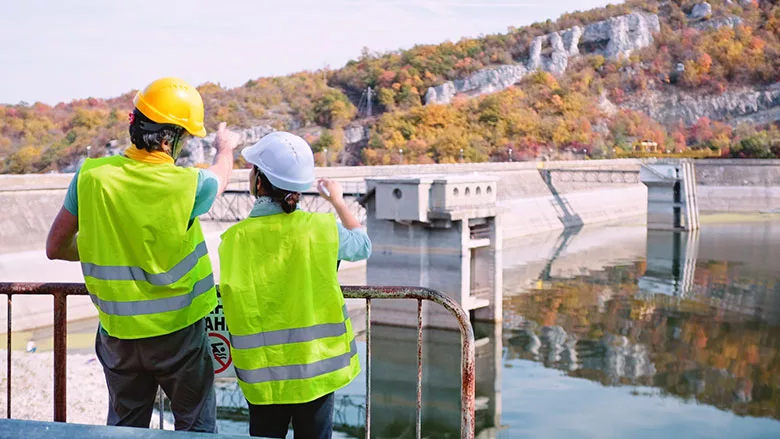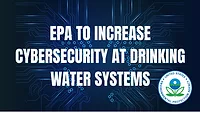EPA Funds Programs to Curb Expected Water-Sector Workforce Shortages
Grants awarded to 13 organizations for programs to attract and retain workers

Source: Getty Images
Significant employee turnover within the water sector is expected over the next ten years, including a wave of retirements by water professionals, so to help increase the workforce within that sector the federal government has awarded more that $20 million in grants to 13 organizations for them to implement programs to attract and retain workers.
The Environmental Protection Agency (EPA) announced the grants on July 11, 2024 under its Innovative Water Workforce Development Grant Program, which supports expanding career opportunities in the drinking water and wastewater utility sector. The grants are to expand public awareness about job opportunities in those sectors while addressing the workforce needs of drinking water and wastewater utilities. Activities that are to be funded by the grants include:
- Targeted internship, apprenticeship, pre-apprenticeship, and post-secondary bridge programs.
- Education programs designed for elementary, secondary, and higher education students.
- Regional industry and workforce development collaborations to address water utility employment needs and coordinate candidate development.
- Integrated learning laboratories in secondary educational institutions.
- Leadership development, occupational training, mentoring, or cross-training programs that ensure incumbent drinking water and wastewater utility workers are prepared for higher-level supervisory or management-level positions.
Among the 13 grant recipients is the American Water Works Association (AWWA), which received $852,000. Barb Martin, the AWWA’s director of engineering and technical services, told The Driller the organization conducts an annual survey in which participants rank the water sector’s top 15 challenges. “The water workforce is definitely ranked among the top 10 in terms of those challenges,” she said.
“The water sector is a wonderful place to build a career, and most people don't know it exists. It’s where there are careers available that can be very fulfilling, enriching, and rewarding.”
– Barb Martins, Director of Engineering & Technical Services
“It’s very important for water utilities to do proactive outreach,” said Martin, who added, “The water sector is a wonderful place to build a career and most people don't know it exists. It’s the place where there are careers available that can be very fulfilling, enriching and rewarding,” she said.
Therefore, the AWWA received the grant to implement a program called the “Transformative Water Leadership Academy” which helps build the leadership, competencies, and networks within the water sector, Martin said.
However, it is important to remember that water utilities have to provide consistent and reliable water services, so those attracted to the water sector do need certain skills, Martin said. “It’s important to not only fill the pipeline of the water workforce, but to ensure that those who are coming into the workforce and advancing within the workforce have the skills and competencies needed,” she said.
So while the workforce turnover in the water sector is expected to be significant over the next decade, the organizations being funded to implement programs that attract and retain workers have to ensure those workers can manage and support the water systems, she said. “While there's a need for people with technical skills to be able to do that job, there’s also a need for people with hands-on-skills to do things like welding and pipe replacement, to do the construction aspects of water as well,” Martin said.
In addition to the AWWA, other grant recipients and the amounts allocated to each are:
- Multiplier/WaterNow Alliance, $760,463.31.
- Rural Community Assistance Partnership, $1 million.
- The Water Tower Institute, Inc., $1.9 million.
- Pacific International Center for High Technology Research, $1 million.
- Wichita State University, $414,250.
- Baltimore City Department of Public Works, $914,500.
- Center for Watershed Protection, Inc., $999,520.
- Grand Rapids Community College, $1 million.
- Board of Regents Nevada System of Higher Education, $999,153.
- University of New Mexico, $600,000.
- National Rural Water Association, $5.5 million.
- Energy Innovation Center Institute, Inc., $4.9 million.
The wastewater utility sector is among the sectors the EPA is providing funding to support expanding career opportunities, and Patricia Sinicropi, the WateReuse Association’s executive director, said the EPA’s investment will help bridge the gap from the workforce challenges of today to the workforce opportunities of tomorrow.
As the water sector faces “a wave of retirement amongst the professionals who build, operate, and maintain water and wastewater treatment plants, investing in the water workforce of tomorrow is essential to ensuring that America's communities can share in the sustainability and resiliency benefits of water reuse,” Sinicropi said.
Within the water sector there are a wide range of opportunities that potential workers can engage in through an apprenticeship, according to Martin. “Apprenticeships are so important,” she said. Water quality testing is among those opportunities, and that involves math and computers, she said. Computers are also used to manage water control systems, as well as cybersecurity at a water utility. “Those are just some of the different aspects of a water job that a prospective hire can learn on the job in an apprenticeship program,” she said.
Looking for a reprint of this article?
From high-res PDFs to custom plaques, order your copy today!




